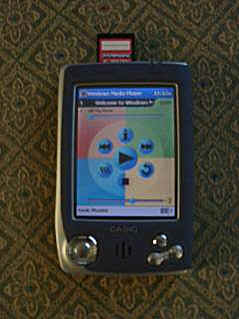|
|
Chris De Herrera's Windows CE Website |
|---|---|
About |
|
| By Chris De Herrera Copyright 1998-2007 All Rights Reserved A member of the Talksites Family of Websites Windows and
Windows CE are trademarks of
Microsoft All Trademarks are owned |
Casio EM-500 Review
By Justin Yu, Copyright 2000
Version 1.00 Revised 12/19/2000
[an error occurred while processing this directive]
Sponsored by |
Introduction
The EM-500 is one in Casio’s
new line of Pocket PC’s. It
offers numerous advantages to the older models E-100/105/115. It is also
the only PDA to offer a Multimedia Card (MMC) expansion slot, as supposed
to the compact flash displayed on other PPC’s.
With the popularity of faceplates nowadays (Nokia cellular phones,
Palm Pilot m100, etc…) Casio has decided to jump on the “eye candy”
bandwagon. The EM-500 is
offered in five colors: Blue,
Sky Blue, Red, Green, and Yellow. (All
five colored PDA’s work exactly the same.)
The generous folks at Mobileplanet originally sent me the Sky Blue
model, but there were complications with the battery compartment, and it
was soon replaced by the Blue EM-500.
Hardware
The
EM-500 runs on a VR4122 150 MhZ MIPS processor.
This is a definite
plus over the older models. Although
it is only a miniscule 19 MhZ faster, a vast improvement in speed is
definitely noticeable. There
was hardly a time when I saw that dreaded hourglass that constantly popped
up on the Jornada 548. Another
improvement on the hardware design is the new version IRDA. This makes transferring files from PPC to PPC lightning fast.
I transferred a 4mb song to my buddy in less than five minutes.
As with all Casio’s, the EM-500’s buttons have the familiar
game pad-like design. Since
this was my first time using a Casio Pocket PC, I was overjoyed
when I found how useful this was, not only for game playing, but for
scrolling through those long documents.
I also loved the “Home” button (programmable), which brought me
back to the main menu when pressed. Unfortunately the new Pocket PC OS does not let the user
close a program, so at times switching back to home just to open a new
application became tedious. The
EM-500 comes housed with 16 Megabytes of memory.
A mere 8 mb of this space is used for storage, and the other 8 is
used for program. I would
suggest to anyone that buys an EM-500 to also buy an MMC if entertainment
is an issue. You will certainly need it.
Screen and Battery Life
The
vibrant 65k color screen provided more than enough color for my eyes.
Adjustments to the brightness of the screen is also possible by
going through the “settings” option.
I personally like to put everything to full, allowing the maximum
enjoyment of the beautiful screen, despite the amount of battery life
sacrificed. I usually got a
good 6 hours with a full battery charge using my brightness preferences. Despite what others on the internet claim, the battery is
replaceable, I checked with Casio myself. They also sell extra batteries, available through mail order
from the catalog bundled into the box.
A full battery charge took around 3 hours, depending on whether or
not the unit had been drained. Another
great thing is that I could actually read in broad daylight! Here in Huntington Beach, there is hardly a day where the sun
does not shine, so I was happy to find out that reading in the sun is
actually possible. Take that,
iPAQ!
Speaker and MMC Card
The speaker on the Em500 is incredible.
The sound quality is excellent, topping around 128k/s bitrate.
The external speaker is especially loud, and headphones it gets
even better. The only thing
that I would complain about is something that has do with the software.
I feel that the Windows Media Player could be improved by
implementing an equalizer, which would control bass, treble, etc…This
would be helpful to those songs which require different sounds.
Along with the EM-500, Mobileplanet also lent me a 32 Megabyte
Sandisk Multimedia Card. Transferring
files from the PDA’s USB cable to the unit itself took a bit of time,
about 2 minutes for a 4 mb MP3. Note:
In order for the EM-500 to recognize that there are mp3’s in the
card, be sure to make a new folder in the card’s directory for “My
Documents.” If you do not
file all your mp3’s in this folder, the Em500 will not identify any
music in the card. I also
tried to download Pocket
TV’s movie player, which I installed very easily.
When I transferred a small clip from the movie “The Matrix,” I
found that the picture was very choppy, stopping every two seconds.
I deleted both the program and the file, and only used the card for
music, which worked perfectly. The
only problem with these MMC’s is the price.
A 32 megabyte card, which can hold approximately 6-8 128k mp3’s
will run you $100 from any major electronics store.
I would suggest purchasing your external storage from ebay,
ubid, or some other
online auction site.
Speed
Luckily for us, Casio was generous enough to include a standard USB cable for the EM-500. This is a giant step up from other PDA’s which still use a serial port connection. Transferring mp3’s and syncing AvantGo channels is a breeze, and a full sync including five channels only took a couple minutes. The Gadgeteer has provided a handy chart which displays calculated speeds.
Stylus
For this reviewer, the stylus is the part of a PDA where style cannot be sacrificed. As we have seen in the past with such styli as the Jornada 54x’s, a cumbersome styli can ruin a PDA’s usability. Casio has done an excellent job by making the stylus look and feel exactly how it is supposed to: like a pen. I would personally prefer all my styli to be metal such as the one included in some of the Palm series’, but hey you can’t win them all. The stylus silo is strategically placed in the back right hand side of the unit, where it cannot accidentally fall out like the snow-pea shaped stylus of the Jornada.
Software
One application which I absolutely loved about the Casio series of PDA’s is the “Home” menu. I like it because it is customizable, ensuring that I only see the items which I use on a daily basis. All the features of the Pocket PC software are included in the Em500, including a couple extras. For all you users who wish to quickly backup your personal files, Casio offers a card backup tool. This piece of software helps you to save all your important data to an MMC. Another handy application which is already installed in the ROM is AOL mail. I did not purchase a modem for this unit, so I didn’t have a chance to test out the utilization of the item, but it seems like it could definitely become an asset to that on-the-go worker. The Casio CD which is included in the box has a plethora of applications which can easily be installed using ActiveSync.
Included in software CD:
Palm Data Converter – Helps to convert Palm Pilot information to the EM-500.
Mobile Video Player – works exactly like Pocket TV, and also includes a thumbnail viewer which helps to organize your files
Mobile Video Converter – This program converts your popular video formats into a special set-up which can be seen on the PDA.
Packet Video – Another video player optimized for wireless delivery.
Audible.com – A website which sells spoken books
ZIO Golf Demo CD – I tested this out, and it is basically a golf game which features courses from around the world
Conclusion
Overall, I would say that I am very impressed with Casio’s effort to continue with a line of Pocket PC’s. The fact that they’re trying to buy into the iMac color scheme seems a bit trivial, but I suppose looks mean a lot to people. I especially enjoyed the layout of the screen and the speed of the unit itself, but I think that two things need to be changed:
1. Price: $499 for an organizer/mp3 player/small video player? The price seems absurd for this unit, despite all the multimedia additives. I believe I speak for all PDAntics when I say, “let’s cut the prices, shall we?”
2. RAM: 16 mb’s of ram is miniscule compared to today’s standard 32. I have no idea why they decided to only build in 16. Could it be that Casio would like to see the MMC used more often, and therefore put less RAM to ensure the user would have to but more memory? Or am I just analyzing too much? You be the judge.
Ratings (Out of 10)
Size and Form Factor: 8
Speed: 8
Reliability: 7
Speaker: 9
Software: 10
Price: 5.5
Overall: 8
[an error occurred while processing this directive]


